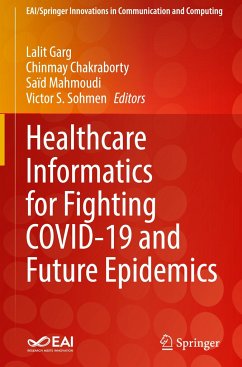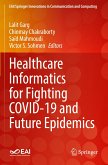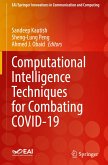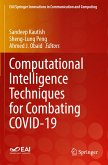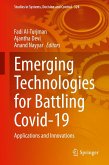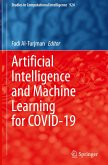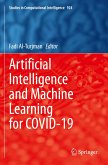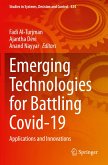Healthcare Informatics for Fighting COVID-19 and Future Epidemics
Herausgegeben:Garg, Lalit; Chakraborty, Chinmay; Mahmoudi, Saïd; Sohmen, Victor S.
Healthcare Informatics for Fighting COVID-19 and Future Epidemics
Herausgegeben:Garg, Lalit; Chakraborty, Chinmay; Mahmoudi, Saïd; Sohmen, Victor S.
- Gebundenes Buch
- Merkliste
- Auf die Merkliste
- Bewerten Bewerten
- Teilen
- Produkt teilen
- Produkterinnerung
- Produkterinnerung
This book presents innovative solutions utilising informatics to deal with various issues related to the COVID-19 outbreak. The book offers a collection of contemporary research and development on the management of Covid-19 using health data analytics, information exchange, knowledge sharing, the Internet of Things (IoT), and the Internet of Everything (IoE)-based solutions. The book also analyses the implementation, assessment, adoption, and management of these healthcare informatics solutions to manage the pandemic and future epidemics. The book is relevant to researchers, professors, students, and professionals in informatics and related topics. …mehr
Andere Kunden interessierten sich auch für
![Healthcare Informatics for Fighting COVID-19 and Future Epidemics Healthcare Informatics for Fighting COVID-19 and Future Epidemics]() Healthcare Informatics for Fighting COVID-19 and Future Epidemics103,99 €
Healthcare Informatics for Fighting COVID-19 and Future Epidemics103,99 €![Computational Intelligence Techniques for Combating COVID-19 Computational Intelligence Techniques for Combating COVID-19]() Computational Intelligence Techniques for Combating COVID-1995,99 €
Computational Intelligence Techniques for Combating COVID-1995,99 €![Computational Intelligence Techniques for Combating COVID-19 Computational Intelligence Techniques for Combating COVID-19]() Computational Intelligence Techniques for Combating COVID-1995,99 €
Computational Intelligence Techniques for Combating COVID-1995,99 €![Emerging Technologies for Battling Covid-19 Emerging Technologies for Battling Covid-19]() Emerging Technologies for Battling Covid-19125,99 €
Emerging Technologies for Battling Covid-19125,99 €![Artificial Intelligence and Machine Learning for COVID-19 Artificial Intelligence and Machine Learning for COVID-19]() Artificial Intelligence and Machine Learning for COVID-1995,99 €
Artificial Intelligence and Machine Learning for COVID-1995,99 €![Artificial Intelligence and Machine Learning for COVID-19 Artificial Intelligence and Machine Learning for COVID-19]() Artificial Intelligence and Machine Learning for COVID-19139,09 €
Artificial Intelligence and Machine Learning for COVID-19139,09 €![Emerging Technologies for Battling Covid-19 Emerging Technologies for Battling Covid-19]() Emerging Technologies for Battling Covid-19181,89 €
Emerging Technologies for Battling Covid-19181,89 €-
-
-
This book presents innovative solutions utilising informatics to deal with various issues related to the COVID-19 outbreak. The book offers a collection of contemporary research and development on the management of Covid-19 using health data analytics, information exchange, knowledge sharing, the Internet of Things (IoT), and the Internet of Everything (IoE)-based solutions. The book also analyses the implementation, assessment, adoption, and management of these healthcare informatics solutions to manage the pandemic and future epidemics. The book is relevant to researchers, professors, students, and professionals in informatics and related topics.
Produktdetails
- Produktdetails
- EAI/Springer Innovations in Communication and Computing
- Verlag: Springer / Springer International Publishing / Springer, Berlin
- Artikelnr. des Verlages: 978-3-030-72751-2
- 1st edition 2022
- Seitenzahl: 460
- Erscheinungstermin: 2. September 2021
- Englisch
- Abmessung: 241mm x 160mm x 31mm
- Gewicht: 852g
- ISBN-13: 9783030727512
- ISBN-10: 3030727513
- Artikelnr.: 61238522
- Herstellerkennzeichnung
- Books on Demand GmbH
- In de Tarpen 42
- 22848 Norderstedt
- info@bod.de
- 040 53433511
- EAI/Springer Innovations in Communication and Computing
- Verlag: Springer / Springer International Publishing / Springer, Berlin
- Artikelnr. des Verlages: 978-3-030-72751-2
- 1st edition 2022
- Seitenzahl: 460
- Erscheinungstermin: 2. September 2021
- Englisch
- Abmessung: 241mm x 160mm x 31mm
- Gewicht: 852g
- ISBN-13: 9783030727512
- ISBN-10: 3030727513
- Artikelnr.: 61238522
- Herstellerkennzeichnung
- Books on Demand GmbH
- In de Tarpen 42
- 22848 Norderstedt
- info@bod.de
- 040 53433511
Lalit Garg is an Information Technology innovator, academician, learner, teacher, developer, keynote speaker, Consultant, and researcher with a demonstrated history of working in the higher education industry and an excellent research publication record. He is skilled in solving complex problems using machine learning and data analytics, especially from the medicine and healthcare domain. Presently he is a Senior Lecturer in Computer Information Systems at the University of Malta, Msida, Malta. He is also an honorary lecturer at the University of Liverpool, UK. He has also worked as a researcher at the Nanyang Technological University, Singapore and the University of Ulster, UK. He has supervised more than 180 Masters' dissertations and guiding 4 PhD thesis. He is awarded a research studentship in Healthcare Modelling to carry out his PhD research studies in the faculty of computing and engineering at the University of Ulster, UK. His PhD research was nominated for the Operational Research Society Doctoral Prize "Most Distinguished Body of Research leading to the Award of a Doctorate in the field of OR". He participates in many EU-funded, and local funded projects, including a one million euros Erasmus+ Programme Capacity-Building projects in the field of Higher Education (CBHE) titled Training for Medical education via innovative eTechnology (MediTec). The University of Malta has awarded him the 2021-22 Research Excellence Fund for exploring Novel Intelligent Computing Methods for healthcare requirements forecasting, allocation and management (NICE-Healthcare). Dr Chinmay Chakraborty is an Assistant Professor at the Department of Electronics and Communication Engineering, BIT Mesra. His primary research areas include wireless body area networks, the Internet of Medical Things, energy-efficient wireless communications and networking, and point-of-care diagnosis. He received an Outstanding Researcher Award from TESFA in2016, a Global Peer Review Award from Publons in 2018, and a Young Faculty Award from VIFA in 2018. He is also the recipient of a Young Research Excellence Award and a Global Peer-Review Award. Prof. Saïd Mahmoudi received his PhD in Computer Science in 2003 at the University of Lille. Since 2008 he has been an Associate Professor at the University of Mons, Faculty of Engineering, Computer Science Department. His topics of interest are artificial intelligence, medical imaging and analysis, image processing and computer-aided medical diagnosis, 2D and 3D retrieval and indexing, images annotation, and the Internet of Things. He has published extensively in books, international conferences, and international journals. Victor Sohmen, PhD, EdD, is a former foreign-going ship captain and project cost-controls specialist. He has taught Project Management at universities in Europe, Asia, Australia, the US, and South America. In 1990 he presented his first PMI Global Conference paper, "The Project Manager as an Information Processor and Change Agent". He has also presented internationally at IPMA, ILA, AACE, AACEI, AIPM, AERA, INTED, and INTCESS conferences, including as Keynote Speaker and Track Chair in Management, Educational Technology, and Cross-cultural Studies. In 1995 he won the Canadian Governor-General's Gold Medal for Academic Excellence. Dr Sohmen is a Canadian citizen and a Philadelphia resident.
Introduction.- SECTION-1: Health Data Analytics and Mining for the COVID-19 pandemic.- COVID-19 pandemic big data analytics and application.- Artificial Intelligence approaches for the COVID-19 pandemic.- Machine learning and deep learning for the COVID-19 pandemic.- Cyber-Social Data Processing and Intelligence Mining for the COVID-19 pandemic.- Cloud-based Intelligent systems for the COVID-19 pandemic.- Smart hospital requirements for infectious diseases treatment.- Big data-driven health risk identification.- Pattern recognition in epidemic risk analysis.- Predictive modelling for the COVID-19 pandemic and future epidemics.- Image processing and computer vision for the COVID-19 pandemic.- Sentiment analysis for the COVID-19 pandemic.- Patient behaviour modelling for the COVID-19 pandemic.- Decision Support Systems (DSS) for the COVID-19 pandemic.- Disease outbreak and progression modelling and simulation for COVID-19 pandemic.- SECTION-2: Information exchange, knowledge sharing, data storage, and security for the COVID-19 pandemic.- COVID-19 information exchange.- Knowledge-sharing for the COVID-19 pandemic.- Blockchain for secured COVID-19 pandemic data handling.- Ontology-based models for the COVID-19 pandemic.- Cloud storage of the COVID-19 pandemic data.- Data warehousing for the COVID-19 pandemic.- Privacy and ethical issues for the COVID-19 pandemic information exchange and sharing.- Text mining and natural language processing for the COVID-19 pandemic.- Secure communication of the COVID-19 pandemic data.- Ensuring the integrity and reliability of the COVID-19 pandemic information.- Infodemic and fake news detection and its social spread prevention for the COVID-19 pandemic.- Data integrity, consistency, and compliance for the COVID-19 pandemic.- Health information impact assessment for the COVID-19 pandemic.- Secure handling and exchange of patient-generated data for the COVID-19 pandemic.- SECTION-3: The Internet of things (IoT) and the Internet ofEverything (IoE) for the COVID-19 pandemic.- Smart sensing for the COVID-19 pandemic.- Cloud-based secure IoT system for the COVID-19 pandemic.- Smart hospital for infectious diseases treatment.- Android Apps for the COVID-19 pandemic.- IoT and IoE application in microbial risk and healthcare.- Wireless sensor networks for the COVID-19 pandemic.- E-health, m-Health, and Telemedicine for the COVID-19 pandemic.- Wearable computing for the COVID-19 pandemic.- Hospital automation systems for the COVID-19 pandemic.- IoT and IoE based patient monitoring systems for the COVID-19 pandemic.- Security of IoT and IoE based data and devices for the COVID-19 pandemic.- IoT and IoE Hardware and software platforms for the COVID-19 pandemic.- Conclusion.
Introduction.- SECTION-1: Health Data Analytics and Mining for the COVID-19 pandemic.- COVID-19 pandemic big data analytics and application.- Artificial Intelligence approaches for the COVID-19 pandemic.- Machine learning and deep learning for the COVID-19 pandemic.- Cyber-Social Data Processing and Intelligence Mining for the COVID-19 pandemic.- Cloud-based Intelligent systems for the COVID-19 pandemic.- Smart hospital requirements for infectious diseases treatment.- Big data-driven health risk identification.- Pattern recognition in epidemic risk analysis.- Predictive modelling for the COVID-19 pandemic and future epidemics.- Image processing and computer vision for the COVID-19 pandemic.- Sentiment analysis for the COVID-19 pandemic.- Patient behaviour modelling for the COVID-19 pandemic.- Decision Support Systems (DSS) for the COVID-19 pandemic.- Disease outbreak and progression modelling and simulation for COVID-19 pandemic.- SECTION-2: Information exchange, knowledge sharing, data storage, and security for the COVID-19 pandemic.- COVID-19 information exchange.- Knowledge-sharing for the COVID-19 pandemic.- Blockchain for secured COVID-19 pandemic data handling.- Ontology-based models for the COVID-19 pandemic.- Cloud storage of the COVID-19 pandemic data.- Data warehousing for the COVID-19 pandemic.- Privacy and ethical issues for the COVID-19 pandemic information exchange and sharing.- Text mining and natural language processing for the COVID-19 pandemic.- Secure communication of the COVID-19 pandemic data.- Ensuring the integrity and reliability of the COVID-19 pandemic information.- Infodemic and fake news detection and its social spread prevention for the COVID-19 pandemic.- Data integrity, consistency, and compliance for the COVID-19 pandemic.- Health information impact assessment for the COVID-19 pandemic.- Secure handling and exchange of patient-generated data for the COVID-19 pandemic.- SECTION-3: The Internet of things (IoT) and the Internet ofEverything (IoE) for the COVID-19 pandemic.- Smart sensing for the COVID-19 pandemic.- Cloud-based secure IoT system for the COVID-19 pandemic.- Smart hospital for infectious diseases treatment.- Android Apps for the COVID-19 pandemic.- IoT and IoE application in microbial risk and healthcare.- Wireless sensor networks for the COVID-19 pandemic.- E-health, m-Health, and Telemedicine for the COVID-19 pandemic.- Wearable computing for the COVID-19 pandemic.- Hospital automation systems for the COVID-19 pandemic.- IoT and IoE based patient monitoring systems for the COVID-19 pandemic.- Security of IoT and IoE based data and devices for the COVID-19 pandemic.- IoT and IoE Hardware and software platforms for the COVID-19 pandemic.- Conclusion.

